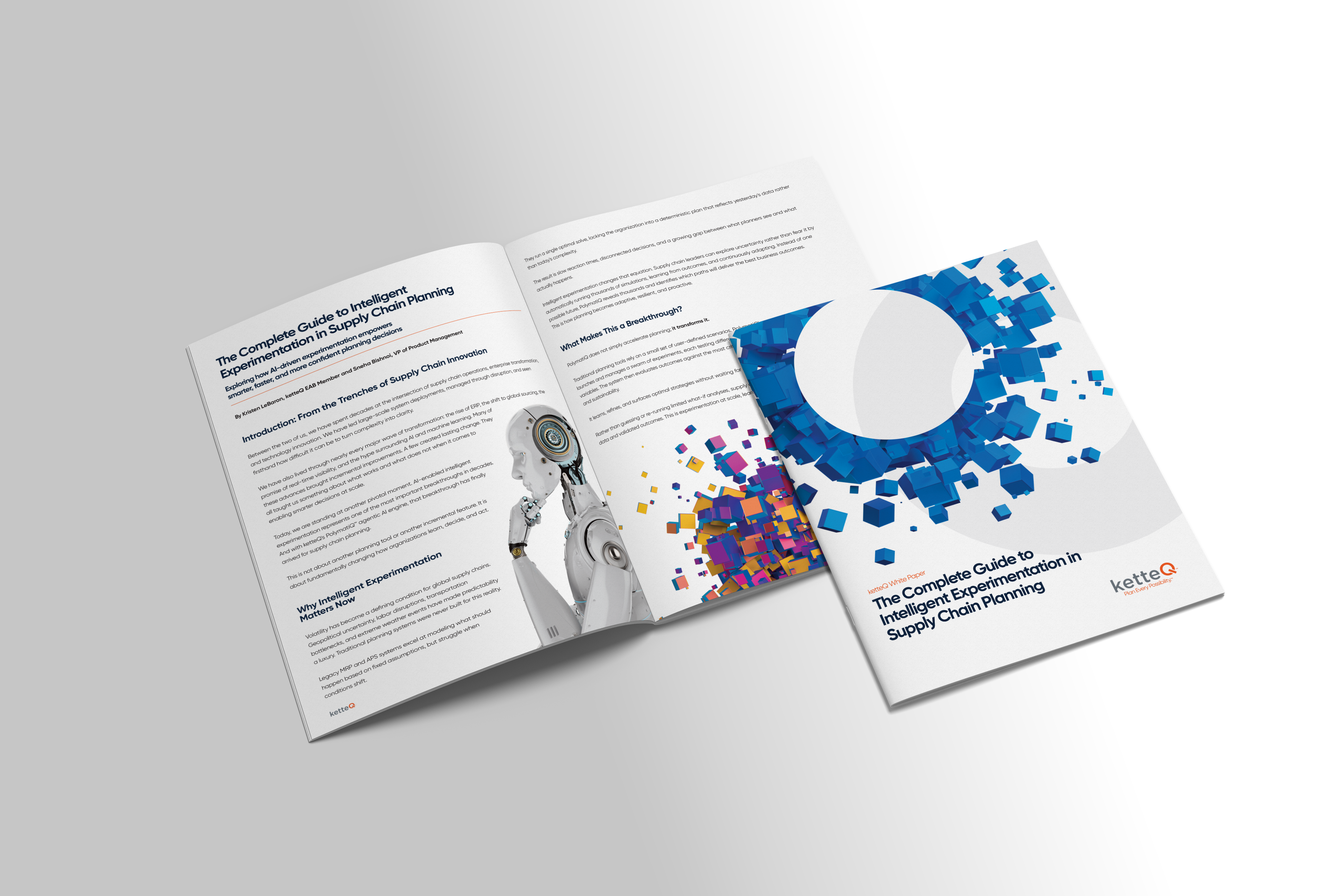
How Intelligent Experimentation Turns Supply Chain Uncertainty into Advantage
Uncertainty is now the rule, not the exception. From material shortages and supplier delays to shifting demand signals and geopolitical shocks, supply chains face levels of volatility that old models were never designed to handle.
For years, companies have tried to fight uncertainty by working harder: adding safety stock, building more reports, and running more “what-if” analyses. Yet despite all the effort, disruptions keep winning. What’s missing is the ability to learn at the speed of change — to turn each disruption into data and each outcome into insight. Intelligent Experimentation, powered by ketteQ’s PolymatiQ™ agentic AI engine, changes that dynamic. It replaces reactive guessing with continuous discovery, using AI to test, learn, and adapt at scale. The result is a supply chain that survives uncertainty and knows how to thrive in it.
From Static Assumptions to Continuous Learning
Traditional planning systems operate on fixed assumptions: predictable demand, stable lead times, and reliable suppliers. When those assumptions fail, so does the plan.
Intelligent Experimentation introduces a fundamentally different approach. Instead of relying on one static solve, it runs thousands of AI-driven experiments exploring every combination of variables, including supply constraints, transportation costs, labor availability, etc. Each experiment is evaluated against business priorities such as cost, service, margin, or sustainability.
The outcome is not a single forecast, but a library of proven strategies that perform under multiple possible futures.
Want to see how Intelligent Experimentation turns disruption into advantage? Download the full guide: The Complete Guide to Intelligent Experimentation in Supply Chain Planning.

How It Works: The PolymatiQ Advantage
At the center of this capability is ketteQ’s PolymatiQ agentic AI engine.
PolymatiQ automates Experimentation across the entire planning process. It creates thousands of realistic simulations, evaluates their outcomes, learns from the best performers, and continuously refines the next round of experiments.
This cycle of testing and learning allows companies to:
- Identify the best trade-offs between cost and service.
- Predict how changes in one variable will ripple across the supply chain.
- Reveal opportunities to use existing assets more efficiently.
- Build confidence in decisions with data-backed validation.
Where traditional systems stop once they generate a plan, PolymatiQ™ keeps learning long after execution begins. It senses shifts in real-time data and automatically reruns experiments to recommend adjustments.
This is not a theory. It is planning that evolves as the business environment changes.
Lessons from Other Industries
If this sounds like a new concept for supply chain, it is. However, intelligent Experimentation has already transformed other industries.
- In pharmaceuticals, AI models now simulate and evaluate millions of compounds before a single physical trial begins, cutting years off development cycles.
- In aerospace, NASA uses automated Experimentation to test thousands of mission paths before deciding which one to launch.
- In finance, trading algorithms continuously experiment with market variables to identify profitable patterns in seconds.
Supply chain planning is now catching up. By adopting the same experimentation mindset, companies can design adaptive supply chains rather than fragile ones.

Proof in Performance
One example comes from PPF, a leading European pet-food manufacturer that had invested heavily in its legacy planning system. Over time, results plateaued, and capacity utilization stalled at 88 percent.
With PolymatiQ, PPF builds on its existing system rather than replacing it. Within five weeks, the first plant went live. The results were immediate and measurable:
- Capacity utilization increased by more than 13 percent.
- Waste dropped by 10.2 percent, saving 22 tons of cost.
- Agility improved across plants, markets, and customers.
Encouraged by these outcomes, PPF expanded PolymatiQ across 12 factories in 10 countries and 35 markets, creating a foundation for continuous learning and enterprise-wide adaptability.
These results show how Intelligent Experimentation converts unpredictability into a source of competitive strength.
From Firefighting to Foresight
The most powerful benefit of Intelligent Experimentation is cultural, not just technical.
It changes the role of the planner. Instead of fighting fires, planners become orchestrators of adaptive strategy. They no longer ask “What went wrong?” but “What could we do better next time?”
This mindset shift, from prediction to learning, is what separates resilient supply chains from fragile ones.

The Competitive Edge for Early Adopters
Every major shift in supply chain management has rewarded the first movers. ERP, IBP, and cloud each created lasting competitive gaps for those who adopted early. Intelligent Experimentation is the next defining moment.
Organizations embracing it now will make faster, smarter decisions and capture opportunities their competitors cannot see. Those who hesitate will be left optimizing outdated plans in an unpredictable world.
Download the Full Guide
Learn how ketteQ’s PolymatiQ™ agentic AI engine redefines supply chain planning through Intelligent Experimentation.
Download the complete guide, The Complete Guide to Intelligent Experimentation in Supply Chain Planning, to explore how leading companies use this breakthrough to transform uncertainty into advantage.






